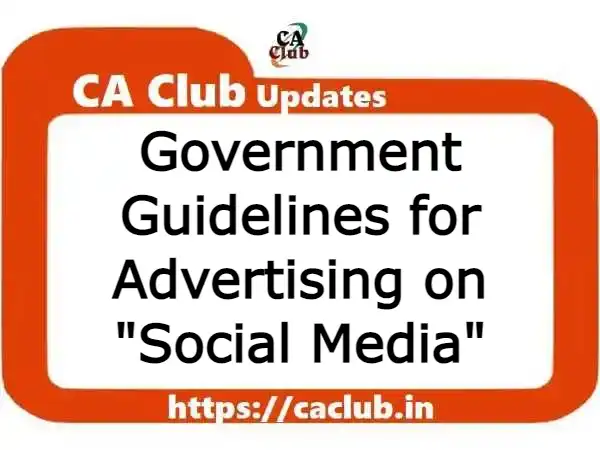The Central Government has recently published a comprehensive set of “endorsement guidelines” for social media advertisements in India by celebrities, influencers, and virtual influencers with the aim of promoting transparent and ethical endorsement practices.
These guidelines seek to safeguard audiences by preventing individuals from using deceptive tactics when endorsing products or services on social media platforms. The purpose of these guidelines is to ensure that all endorsements are clearly labelled and that any statements made about the product or service are factual. Additionally, influencers are required to disclose any financial or commercial relationships they may have with the brand they are endorsing. Overall, these guidelines are designed to protect and inform audiences by promoting truthful and transparent endorsement practices.
The guidelines announced by the government reflect a commitment to safeguarding consumers from misleading advertising and promoting transparency within the influencer industry. The guidelines have been established with the purpose of ensuring that individuals endorsing products or services do not deceive their audiences.
In light of the increasing prevalence of digital advertising, there is a growing risk of consumers being misled by advertisements and unfair trade practices on social media platforms. Responding to this trend, Rohit Kumar Singh, Secretary of Consumer Affairs, has issued guidelines that take into account the rapidly expanding digital landscape, where advertising is no longer limited to traditional media outlets like print, television, and radio.
It is imperative that any high-profile individual, including celebrities and influencers, who has the means to sway their followers’ decisions or perspectives on a product, brand, or experience, must disclose any relevant affiliations with the advertiser.
In 2022, The Department of Consumer Affairs released guidelines aimed at curbing misleading endorsements and advertisements, aptly titled “Guidelines for the Prevention of Misleading Advertisements and Endorsements.”
The guidelines specify the criteria for valid advertisements along with the responsibilities of manufacturers, service providers, advertisers, and advertising agencies. Furthermore, the guidelines provide guidance for celebrities and endorsers. The guidelines make it clear that any form of misleading advertising across any medium is illegal.
The Department of Consumer Affairs, under the Ministry of Consumer Affairs, Food, and Public Distribution, has recently released a set of guidelines called “Endorsements Know-hows!” specifically catering to celebrities, influencers, and virtual influencers on social media platforms. The guidelines aim to promote transparency and honesty in product or service endorsements and to ensure compliance with the Consumer Protection Act and relevant regulations.
In accordance with established guidelines, it is required that endorsements be presented in a clear and concise manner using plain language. The terms “advertisement,” “sponsored,” “collaboration,” or “paid promotion” may be utilized to signify the nature of the endorsement. It is imperative that individuals do not endorse any product or service that they haven’t personally used or experienced, or for which they have not conducted sufficient research.
The ambiguity surrounding the appropriate disclosure term to be used for different types of partnerships has been noted by the Government. To clarify, any of the following disclosures may be used for brand endorsements that have been paid for or bartered: “advertisement,” “ad,” “sponsored,” “collaboration,” or “partnership.” It is important to note that the chosen term must be indicated as a hashtag or in the headline text.
Individuals or groups who possess the capacity to reach a significant audience and sway their purchasing decisions or opinions on a product, service, brand, or experience through their influencer/authority or celebrity status, knowledge, position, or relationship with their audience must comply with disclosure guidelines.
According to the established guidelines, it is mandatory to include a disclosure in endorsement messages that is clear, prominent, and easily noticeable. Hashtags or links should not be combined with disclosures. To ensure that viewers acknowledge the endorsement in a photograph, disclosures should be superimposed over the image. In the case of endorsements presented in video or live streams, disclosures must be made in both audio and video formats and displayed continuously and prominently throughout the entire stream.
As per industry guidelines, it is advised that celebrities and influencers thoroughly review the claims made in an advertisement and verify that the advertiser can provide evidence to support them. Additionally, it is recommended that endorsers personally use or experience the product or service being promoted.
Finally, the guidelines aim to uphold the integrity of product and service endorsements and ensure that individuals do not engage in deceptive practices that may mislead their audience. In compliance with the Consumer Protection Act and relevant rules and guidelines, celebrities, influencers, and virtual influencers are expected to adhere to these guidelines. By doing so, they can maintain transparency and authenticity with their audience.
